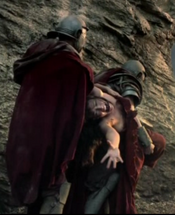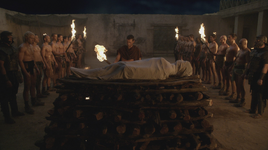| Sura | ||
|---|---|---|

| ||
| First appearance | S1E01: The Red Serpent | |
| Last appearance | S1E06: Delicate Things (Alive) S1E07: Great and Unfortunate Things (Deceased) S1E11: Old Wounds (Spartacus' Vision) S2E10: Wrath of the Gods (Flashback) S3E10: Victory (Flashback) | |
| Profession | Prophetess Slave | |
| Race | Thracian (Maedi) Slave | |
| Relationships | Spartacus (Husband, deceased) | |
| Status | Deceased (Killed by Aulus, on Batiatus' orders) | |
| Actor/Actress | Erin Cummings | |
Sura was Spartacus' Thracian wife, who was tragically taken from him by his most hated enemy, Gaius Claudius Glaber. However, her memory was kept alive and honored by her husband, who actually used it as his inspiration.
Appearance[]
Despite her usually wearing only a set of simple commoner clothes, Sura was still an extremely beautiful woman, shapely body and long, wavy dark brown hair. Her beauty was such that she caught the eye of Spartacus, who at that point in time had been a womaniser, and after lying with her, he fell in love with her.
Personality[]
As a Prophetess of the Gods, Sura had the ability to foresee the future in dreams, and was therefore wise, intuitive, and psychic.
When she and Spartacus first met, she admitted that she already knew of him and that she was the only woman he would ever love. As his wife, Sura was faithful, loving, and devoted to her husband's welfare: she often advised Spartacus on the best path to take, and though he neither favored nor fully believed in the Gods, she still shared with him the wisdom that they had granted her through her abilities.
One notable quality about Sura would be her respect for the free will of others: though she wished to see Spartacus out of harm's way, she still respected his choices, and left him to his path in spite of her own misgivings regarding those choices.
Even after her death, Spartacus constantly saw her in his dreams where she points him in the right direction.
Last but not least, Sura was strong-willed and resourceful, fighting fiercely to defend herself when attacked by barbarians in Spartacus' absence.
Blood and Sand[]
When Spartacus chooses to fight with the Romans, Sura begs him not to go, prophesizing that if he does, he will find himself kneeling before a red serpent and terrible things will come to pass. At Spartacus' return, she

Sura taken by Romans.
is being attacked by barbarians and helps him fight them off. Together they flee their home village and camp in the wilderness. However, seeking vengeance for Spartacus' betrayal, Gaius Claudius Glaber captures and enslaves the two in the darkness of night, separating them immediately. Sura screams in the guards' arms as they carry her away from her husband.

Sura's last moments.
During her time in captivity, she is bought by a Syrian man and is to be transported to Syria. At Batiatus' request, Marcus Pelorus searches for Thracian women being sold by Syrians. She was purchased by Pelorus just before his death, and arrives in Neapolis just after Batiatus and Spartacus' departure back to Capua. She is sent to the heir of the Pelorus estate (Batiatus). However, Batiatus believes (correctly) that Spartacus might try to escape from the ludus once he and Sura are reunited, and has her mortally wounded by his servant, Aulus, on the road, so that she dies in Spartacus' arms when she arrives.[1] Spartacus believes that her caravan was attacked, but it revealed that it was by Batiatus' order to break his desire for freedom.

Sura's funeral pyre.
After her death, Spartacus still sees Sura in his dreams and visions. After Varro's death, whilst Spartacus is recovering from his wounds, both Sura and Varro come to Spartacus in a vision. Sura tells him to tend to Old Wounds, spurring him to check Aulus for wounds from the alleged attack on the caravan. Spartacus strangled Aulus and thus discovered the truth of his wife's death and killed Aulus for his actions and "become himself" once again.
Spartacus soon decided to lead a rebellion using Sura's words and personally confront Batiatus.
Vengeance[]
Before Spartacus finally kills Glaber, there is a succession of visions of Sura as she is captured by the Romans, and after Glaber's death, another series of visions of Sura being laid to rest. With Aulus, Batiatus, and Glaber now dead, Spartacus' mind is now at peace and without Vengeance.
War of the Damned[]
Even though the men responsible for Sura's death are dead, all killed by Spartacus himself, he continues to hold an empty heart and holds the memory of her as the resolve to fuel his desire to end slavery in Rome forever by ending the lives of as many Romans as possible. Laeta, however, suggests that Spartacus is no longer consumed by the grief and vengeance of Sura's death, but by his desire to free all slaves beneath the heel of the Republic.
After Crixus died, the surviving rebels make a pyre in honor of him and their fallen comrades. Spartacus honors his wife by shouting her name, as well as the names of Varro and Mira.
Before the final battle against Crassus, Spartacus speaks with Gannicus. Spartacus tells him of how Sura told him that he would never love another woman, and how her death is why he feels compelled to defend the innocent against Roman oppression, but now realises that doing that is not by how many Romans he kills, but by how many slaves he saves.
After suffering mortal wounds at the hands of Crassus's soldiers, Spartacus sees Sura standing on their homeland of Thrace and looking at him.
List of Appearances[]
Spartacus: Blood and Sand
- 101: The Red Serpent
- 102: Sacramentum Gladiatorum
- 103: Legends
- 104: The Thing in the Pit
- 106: Delicate Things
- 107: Great and Unfortunate Things
- 111: Old Wounds
Books[]
Sura appears very briefly as a character in Spartacus: Swords and Ashes.
Historical context[]
The sole source for Spartacus having a wife comes from the writer Plutarch. Having lived 150 years after Spartacus' rebellion, His sources were based on the largely missing accounts of Sallust, so it is unknown whether or not the mention of a wife of Spartacus was indeed from Sallust's accounts, or simply an invention by Plutarch.
What is said about Spartacus' wife is that like him, she was a Thracian and was enslaved along with him after he deserted the Roman legions, and supposedly sold with him to Batiatus. The sources say she was a prophetess who infact envisioned Spartacus being strangled by a snake, which she prophesied that it meant Spartacus would be destined for great, and unfortunate things. She was most likely a follower or priestess of Dionysus, the god of wine and ecstacy, and the national god of Thrace. Dionysian worship had been a driving force behind a number of Roman slave revolts, including the two previous Servile Wars in Italy, as well as a number of smaller and shorter revolts on the mainland. By the time of Spartacus' revolt, worship of Dionysus had been banned throughout the Republic, and was only allowed to be practised by women and slaves.
It is presumed that Spartacus' wife, along with any and all worshipers of Dionysus in Spartacus' rebellion began a religious following who successfully convinced many of the rebels (those who weren't German, Celtic or African) that Spartacus was a "divine hero", perhaps a demigod or a god in a human form.
In other adaptations[]
- Spartacus has been given a wife in several adaptations of Spartacus. One example is that of Varinia, who is a character in both the 1960 Spartacus film starring Kirk Douglas, and the 2004 miniseries (both of which are based on Howard Fast's 1951 novel). In the 1960 film Varinia is depicted as a Britannic slave, and in the 2004 miniseries she's a Gallic slave. In both adaptations, she becomes the concubine of Spartacus and later on his wife. In the rebellion, she and Spartacus conceive a child together (in the miniseries Varinia has a miscarriage, but eventually conceives another child with him). She gives birth to a son in both adaptations. After Spartacus' rebellion is defeated, Varinia becomes a hostage of Crassus along with her son, until they are aided by Senator Gracchus (Agrippa in the miniseries) and taken far away from Rome, being led out by Batiatus in the 1960 film and Flavius, one of Agrippa's allies, in the miniseries. Varinia's fate is unknown in the 1960 film, however in the miniseries she and her son (whom she names Spartacus) are brought to a village (possibly Gallic) to live in peace.
- Spartacus also has a wife in the books Spartacus: The Gladiator and Spartacus: Rebellion, written by Ben Kane. In the books, Varinia also gives birth to a son, and like the 1960 and 2004 movies, she ultimately survives and raises their son in freedom.
Trivia[]
- Erin Cummings, the actress who plays Sura, is 170cm (5'7") tall and her weight is 58kg (129 lbs)
- In the series premiere "The Red Serpent" Sura envisioned Spartacus would fall under a great red serpent. In the series finale "Victory" the final scene shows Spartacus's grave topped with Agron's shield bearing the image of a Red serpent, fulfilling Suras prophecy.
- Sura was the second main character to be killed.
- Sura is short for "Suratralis", a Thracian name meaning "strong" or "brave".
- As a member of the Maedi tribe of Thrace, Sura's homeland would have been in the region of what is now Blagoevgrad Province, Bulgaria.
Quotes[]
"You have always been destined for great and unfortunate things."
- Sura to Spartacus
"Kill them all."
- Sura to Spartacus
References[]
- ↑ Spartacus: Blood and Sand Season 1; Episode 6